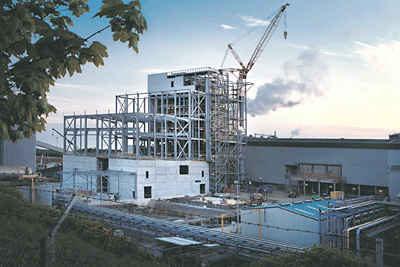New Biofuel Boiler to Eliminate Fossil Carbon Emissions at Iggesund's Workington Mill
 Print this article | Send to Colleague Print this article | Send to Colleague
 On the heels of starting up a new, EUR 240 million recovery boiler at its Iggesund Mill in Sweden last month, Iggesund Paperboard reports that in about six months' time the company will see the results of yet another huge investment at one of its mills—a biofuel boiler costing EUR 123 million at its Workington, England, mill. The new boiler will enable Iggesund's board mill in Workington to operate without fossil carbon emissions and solely on biomass. On the heels of starting up a new, EUR 240 million recovery boiler at its Iggesund Mill in Sweden last month, Iggesund Paperboard reports that in about six months' time the company will see the results of yet another huge investment at one of its mills—a biofuel boiler costing EUR 123 million at its Workington, England, mill. The new boiler will enable Iggesund's board mill in Workington to operate without fossil carbon emissions and solely on biomass.
"For us, the investments mean that we should be able to stabilize our energy costs," explains Guy Mallinson, sales director at Iggesund Paperboard. "When both politicians and industry organizations emphasize strongly that reduced fossil carbon emissions are the way of the future, it's a wise idea to listen. We know that our product portfolio, both from Iggesund and Workington, will now belong to a small, exclusive group of paperboard products whose manufacture involves extremely small amounts of fossil carbon emissions."
Iggesund's goal is to totally eliminate the use of fossil fuels in its own production process. However, this is not the same as having a zero carbon footprint because a number of the company's input goods, primarily cooking chemicals and latex, are made with relatively high carbon emissions.
"Today there are no good alternatives," Mallinson continues. "If consumers want to access all of the good features of paper and paperboard products, then they need to accept that it's impossible to reduce the carbon footprint to zero under the current definition. But we are still producing a fraction of that emitted by competing materials like plastic, metal, or glass."
Duiring the past two years, Iggesund Paperboard's investments equated to just over half of the company's annual net sales of almost EUR 600 million. The money invested into Iggesund Mill will enable a gradual increase in production. The integrated pulp and paperboard mill is currently allowed to manufacture up to 355,000 metric tpy of paper pulp. Negotiations begin this autumn at the Swedish Environmental Court to increase the production permit to 420,000 metric tpy.
One of the conditions for such an increase was an enlargement of the mill's water purification system. In 2009, during the worst of the global financial crisis, Iggesund invested EUR 25 million in a chemical water purification facility.
"Compared with the large sums involved in our energy investments, this was a minor amount, but it was extremely important for the marine ecosystem right beside the mill," Mallinson says. "We've now progressed so far that no chemical analysis in the world can show any differences between fish that lived in the sea off Iggesund Mill and fish that lived in the reference zones far away from any influence by a paper mill."
|
|

